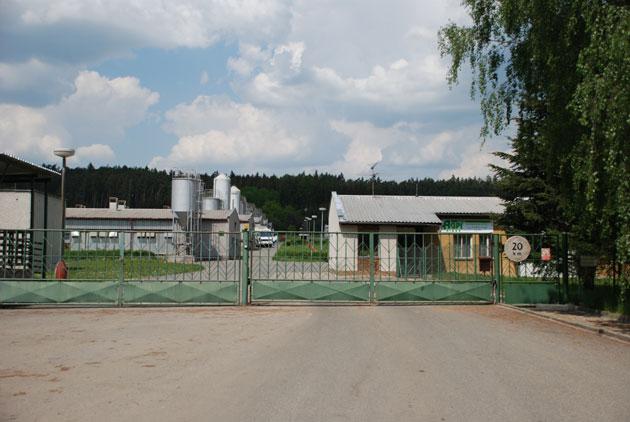Czech political parties agree pig farm on Roma Holocaust site should be removed

The topic of journalist Martin Veselovský’s fourth election special for Czech Radio on news server Rozhlas.cz was racism and relations toward minorities in the Czech Republic. Among the topics that were discussed was the possible removal of the pig farm located on the site of the former concentration camp for Romani people at Lety by Písek.
The candidates participating in the discussion were Martin Komárek of ANO 2011, Jan Bartošek of the Christian Democrats (KDU-ČSL), Soňa Marková of the Communist Party of Bohemia and Moravia (KSČM), Helena Langšádlová of TOP 09, Jaroslav Foldyna of the Czech Social Democratic Party (ČSSD), Yvona Legierská of the Citizen’s Rights Party for Zeman (SPOZ) and Drahomíra Miklošová of the Civic Democratic Party (ODS). During the debate the invited representatives of these political movements and parties managed to reach an unusual level of agreement on more than one point.
When asked whether they would ultimately support the purchase and removal of the pig farm at Lety by Písek and the construction of a memorial to the Roma Holocaust there using government money should they be elected to the lower house, all of those participating in the debate said they would. They also all agreed that such a decision would have to be taken on the basis of expert evaluations and negotiations with the owners of the pig farm to determine a reasonable purchase price.
"Yes… if the purchase price would be humane and not usurious, and if private organizations would also participate in building the memorial. I think we could raise money from private sponsors," said Komárek (ANO 2011).
Jan Bartošek (KDU-ČSL) also mentioned the essential historical context regarding the operation of the concentration camp for Romani people at Lety. "One thing is significant, namely, that the concentration camp at Lety was not run by the Germans, but by the Czechs. That means our nation bears a share of responsibility for what went on there," Bartošek emphasized.
"What we are fighting today is the result of that tragic history," responded Langšádlová (TOP 09).
The candidates also agreed, for example, that the problem in Czech society is less of a racial one than a social one and should be addressed as such. They also said they would adopt ceilings for the amount of state housing benefits provided to the indigent.
ODS would set the ceiling at CZK 1 000 per bed per month in the residential hotels. Communist Soňa Marková said it would not work to address the issue so strictly.
"Here the point is that this shouldn’t become a business, but that people should be provided social housing so they do not have to live in ghettos and residential hotels," Marková (KSČM) said.
Yvona Legierská (SPOZ) pointed out that the Czech Republic already has a social housing concept. "Look at the Concept for Roma Integration 2010 – 2013, approved by the previous government. If we were to properly implement it, we would only have half of these problems today," Legierská said.
Martin Komárek (ANO 2011) believes the newly elected lower house will have to resolve social housing. "The parties here have approved a law that makes it possible to traffic in poverty and for crooks to rob the state. That’s the law that makes it possible to charge CZK 10 000 per month per bed in a residential hotel. That law is evidently bad, it’s contemptible, and we must, during the first session of the new lower house, combine our forces to propose a law that will make this impossible," Komárek emphasized.
The candidates most agreed with one another on the topic of stopping loan-sharking, which was raised by Bartošek (KDU-ČSL). "We want to set a ceiling on the cost of the annual percentage rate (APR) of 20 per cent, including all fees. That means any contracts that are concluded beyond that framework would be considered invalid and not reclaimable. We view loan-sharking as tax evasion, which means that those who operate such businesses would be criminally prosecuted," Bartošek said.
Tightening up loan conditions would even be supported by Miklošová (ODS). "I believe it would definitely be appropriate for the possible interest rate to have a ceiling, because even though I cannot remember what it was like during the First Republic, I am informed that there was such a ceiling back then and that everything above it was considered a felony," she said.
TOP 09 has a solution as well. Langšádlová (TOP 09) said there is a need to augment the criminal code, which does define loan-sharking, but no one has ever been convicted of it, according to her.
"What I would like to expand is the felony crime of usury by corporations, because very often this usury is committed by legal entities," Langšádlová pointed out.
Foldyna (ČSSD) would focus not only on interest rates or the APR, but also on other aspects of loan contracts. He praised the fact that all of the candidates agreed on this point.
"We would have to define this further during a second reading [of a bill], but we can see here that loan-sharking is a big problem now and we must deal with it," Foldyna.
As per the rules of Czech Radio, the debate featured representatives of the seven political movements and parties that have achieved at least 3.5 % of the vote in opinion polls conducted by reputable agencies. Video footage of the debate can be seen (in Czech only) at http://www.youtube.com/watch?v=2YMGD0ZTVZY&feature=player_embedded